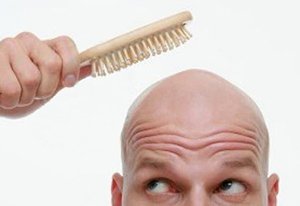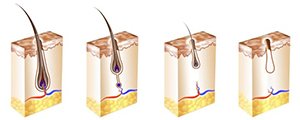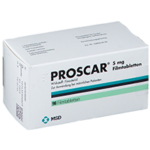What is Propecia?
Propecia 1mg (finasteride) is an oral drug assigned for the treatment of hair loss in men (androgenetic alopecia). This molecule is able to stop the fall and induce hair regrowth, especially in the early stages of the disease.
Mechanism of action
 The mechanism of action of finasteride consists in the inhibition of the enzyme 5-alpha-reductase, the enzyme that converts testosterone to dihydrotestosterone (DHT). This last metabolite turns out to be harmful for the follicles of some areas of the scalp, which undergo a progressive thinning.
The mechanism of action of finasteride consists in the inhibition of the enzyme 5-alpha-reductase, the enzyme that converts testosterone to dihydrotestosterone (DHT). This last metabolite turns out to be harmful for the follicles of some areas of the scalp, which undergo a progressive thinning.
The blocking of the mechanism of action of 5-alpha-reductase therefore leads to thickening and an improvement in the appearance of the hair. Propecia is meant, however, only for the treatment of male-type androgenetic alopecia; furthermore, its maximum efficacy was confirmed in patients aged between 18 and 41 years.
Propecia Dosage
Cipla Propecia has a form of an oral tablet containing finasteride 1mg to be taken once daily. It is necessary that you talk to a certified doctor who will carry out a physical and laboratory examination to rule out eventual contraindications.
Take a pill of Propecia with a sufficient amount of water, swallowing it whole without chewing, breaking or crushing it in your mouth. Taking the drug after a meal decreases the incidence of adverse events.
Propecia vs Proscar
Finasteride acts against male hair loss by blocking the above enzyme and preventing much of the conversion from testosterone to dihydrotestosterone. Men with relatively light hair loss can certainly be expected to benefit from taking Propecia. The longer the hair loss comes, the less effect the drug will have. You should also be aware that Propecia is to be taken every day and you stop taking the tablets, the effect of the drug will disappear.
Proscar also contains finasteride but is a drug for prostate problems caused by an enlarged prostate. DHT is thought to stimulate the growth of the prostate gland in rising age and an enlarged prostate can push the urethra and cause problems with emptying the bladder.
Propecia vs Avodart
 The active substance Avodart (dutasteride) is mentioned in some hair forums to counteract hair loss. The substance is found in Avodart, which is a prostate medicine and the substance has been included in various FDA.
The active substance Avodart (dutasteride) is mentioned in some hair forums to counteract hair loss. The substance is found in Avodart, which is a prostate medicine and the substance has been included in various FDA.
Avodart is used to treat prostate enlargement. But the US FDA has not approved the drug to treat hair loss despite there being a doctor who sometimes prescribes the off-label drug for male hair loss.
Dutasteride works similarly to finasteride, but may be more effective. Like finasterid, the drug inhibits type II 5-alpha reductase activities. The substance also inhibits type I of the enzyme. Because dutasteride blocks both types of the enzyme, DHT is lowered even further, reducing the risk of damage to the hair follicles. This drug has the same limitations as finasteride, which means that it only works if taken daily and may become less effective over time.
Despite this similarity in efficacy and side effect spectrum, there are differences between dutasteride and finasteride which may affect the choice of drug.
Propecia half-life is six to eight hours. Avodart has a half-life of approximately three to five weeks. This means a risk of significantly longer duration of concentration-dependent side effects for dutasteride.
Propecia vs Rogaine
Rogaine is one of two medicines for hair loss approved by the US Medicines Agency (FDA). The hair preparation is primarily marketed by the pharmacy as a means of counteracting genetic hair loss in men, but it can be also used in women, unlike Propecia which is contraindicated for the use in females. Rogaine is a drug in form of spray to be applied to the hair roots, unlike Propecia, which is a peroral medication.
Propecia vs Finpecia
Propecia and Finpecia both contain the same active ingredient, finasteride, in equal amounts. The manufacturers are different, but the drugs are mutually interchangeable, since they share the same composition, and thus same efficacy, safety, posology and dosing instructions.
How long does it take Propecia to work?
Propecia is designed to be taken over a long term, at least for several consecutive months, for the drug to produce any meaningful results. As long as an individual starts developing hormonal imbalance that predisposes him to hair loss, the work of hormones cannot be affected in any terminative way, so the therapy should be introduced on daily basis, and possibly for a lifetime, if one wants to see meaningful results.
Propecia Side Effects
Finasteride has been registered since September 1992 with a five-fold higher dose for the treatment of benign prostatic hypertrophy (Proscar). Thus, there is a multi-year safety experience of treatment with this substance at a five times higher daily dose.
Prior to the registration of Propecia, 1,793 patients were exposed to finasteride in the presented Phase II and Phase III studies and could be evaluated for safety reasons. The average treatment duration was 312 days and the maximum treatment times were just under three years. The side effect profile is comparable to that reported for Proscar and has consisted mainly of sexual dysfunctions such as impotence, decreased libido and decreased ejaculate. These were reported in a frequency of 3-4% of the randomized patients treated with 1 mg of finasteride, were usually transient during treatment or had disappeared upon discontinuation and differed only marginally from the frequency reported for the placebo group. Finasteride, theoretically, due to its mechanism of action, could negatively affect male fertility. In animal experiments, the effect of finasteride has been studied with respect to the function of testicle, bittern and prostate as well as fertility and development of the offspring. In rats, no adverse effects have been noted on sperm formation, while prostate, epididymis and semen are affected at very high doses of finasteride. Fertility was also adversely affected by dosages that exceeded clinical exposure. However, the offspring of treated males developed normally, and their reproductive ability was not affected. Due to physiological differences in the reproduction process between humans and rats, these results are not considered to have any relevance to humans. Experiments on dogs and rabbits, which physiologically more closely resemble man, have not shown any adverse effects on reproductive ability after treatment with finasteride. Overall, experiments performed on animals have shown that there is no, or very small, risk of fertility disorders in men taking finasteride on the indication of male hair loss.
Propecia Contraindications
The use of Propecia is contraindicated in women and children, as well as in adult men with insufficient liver or kidney function.
Prppecia Analogs
- Finpecia – Cipla
- Finasteride – Cipla
- Finax – Dr. Reddys Laboratories Ltd.
- Finalo – Dr. Reddys Laboratories Ltd.
- Finast – Intas Pharmaceuticals Ltd.
- Finar – Yaher Pharma
Posted in Men’s Health
(1 voices, average: 5 of 5) 4838 views























